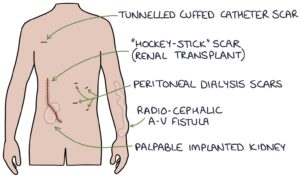A renal transplant is where a kidney is transplanted into a patient with end-stage renal failure. It typically adds ten years to life compared to just using dialysis and significantly improves quality of life.

Donor Matching
Patient and donor kidneys are matched based on the human leukocyte antigen (HLA) type A, B and C on chromosome 6. They do not have to match fully, but the closer the match, the less likely there is organ rejection and the better the outcomes. Recipients can receive treatment to desensitise them to the donor HLA in preparation for a transplant from a living donor.
Procedure
The patient’s kidneys are left in place. The donor kidney blood vessels are connected (anastomosed) with the pelvic vessels, usually the external iliac vessels. The ureter of the donor kidney is anastomosed directly with the bladder. The donor kidney is placed anteriorly in the abdomen and can usually be palpated in the iliac fossa area. A “hockey stick” incision is typically used, and there will be a “hockey stick” scar.
After The Renal Transplant
The new kidney will function immediately.
Basiliximab is a monoclonal antibody targeting the interleukin-2 receptor on T-cells. Two doses are given after surgery to prevent acute rejection.
Patients require life-long immunosuppression to reduce the risk of transplant rejection. There are various options and combinations of:
- Tacrolimus
- Mycophenolate
- Ciclosporin
- Azathioprine
- Prednisolone
TOM TIP: When examining a patient with a renal transplant, you can look particularly clever by looking for the side effects of particular immunosuppressant medications.
- Immunosuppressants cause seborrhoeic warts and skin cancers (look for scars from skin cancer removal)
- Tacrolimus causes a tremor
- Cyclosporine causes gum hypertrophy
- Steroids cause features of Cushing’s syndrome
Complications
Complications relating to the transplant:
- Transplant rejection (hyperacute, acute or chronic)
- Transplant failure
- Electrolyte imbalances
Complications related to immunosuppressants:
- Ischaemic heart disease
- Type 2 diabetes (steroids)
- Infections are more likely, more severe and may involve unusual pathogens
- Non-Hodgkin lymphoma
- Skin cancer (particularly squamous cell carcinoma)
Unusual infections can occur secondary to immunosuppressant medication, such as:
- Pneumocystis jiroveci pneumonia (PCP/PJP)
- Cytomegalovirus (CMV)
- Tuberculosis (TB)
Last updated September 2023
